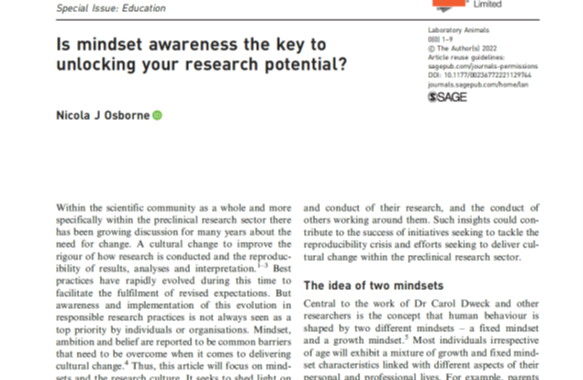Based upon an article “Is mindset awareness the key to unlocking your research potential?”1 written by Dr Nikki Osborne for an Education Special Edition of Laboratory Animals.
Did you know?
Mindset has been reported to be a common barrier that needs to be overcome when it comes to delivering cultural change within the laboratory animals sciences.2
Why?
An individuals mindset can influence their willingness to consider and accept different ways of working and their ability to implement change. It can also affect peers and colleagues, as we are all influenced by what we hear and see going on around us.
Does this matter?
Yes, because research is not easy! It requires us as individuals to be able to adapt to what is a constantly changing and sometimes rapidly evolving environment. Whether that means keeping up to date with the latest findings within our personal research disciplines, or being aware of technical developments and best practice.
As we strive to deliver ethical, rigorous and reproducible results, the actions required (be that planning, designing, conducting, analysing, communicating or disseminating research) will test each and every one of us in different ways.
So, another question…
When was the last time you stopped to think about your mindset?
Your mindset determines how you will react to different experiences, the decisions you will make and how you respond to the challenges that your work will throw at you. It influences not only your behaviour, but also the impact that your behaviour has on others working around you.
But your mindset is not fixed, or pre-determined.
So with awareness and understanding of mindset traits and behaviours we are all capable of learning to develop or adjust our mindset. Despite this knowledge, mindset is very rarely spoken about within many sectors of the research community including the laboratory animal sciences and life science sector more broadly.
Is now the time for change?
We live in a world where there is growing awareness of the importance of an individuals mental and physical health. A good research culture and/or culture of care is considered desirable and worth taking time to develop and maintain. Awareness of mindset traits, triggers and behaviours can enhance these developments further.
As individuals we can benefit from better understanding our own behaviours, triggers and that of others working around us. Educators, mentors and supervisors can learn to identify mindset characteristics in others so that they can offer the support or guidance that individuals need to develop behavioural traits beneficial to themselves and others working around them. Research groups, institutes and organisations can use mindset awareness to inform discussions and decisions regarding how individuals behaviours are managed or rewarded to facilitate change.
Want to find out more?
To access the full open access article published online CLICK HERE.
Check out details of the Mindset To Growth and Enabling Your Growth Mindset training programmes we offer by visiting out Mindset Training page.
Join Nikki for a FREE webinar discussing the question “Is mindset awareness helpful within research cultures?”
This webinar has now taken place and is available to watch on-demand. For FREE access CLICK HERE.
During this webinar will cover key concepts from her recently published article and you will learn about:
- the idea of two mindsets;
- how the two mindsets differ;
- how different mindsets influence behaviour;
- further information links.
References
-
Osborne NJ. Is mindset awareness the key to unlocking your research potential? Laboratory Animals. 2022;0(0). doi:10.1177/00236772221129744
- RSPCA. Report of an RSPCA online debate. Could we achieve a phaseout of animal experiments in the UK?, https://www.rspca.org.uk/webContent/staticImages/Downloads/UKPhaseOutFull.pdf (2021, accessed 17 March 2022).
For details regarding all previous and up coming FREE Responsible Research Webinars visit our website.










